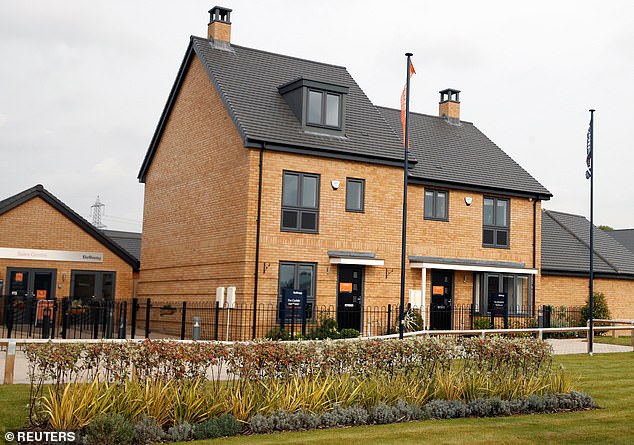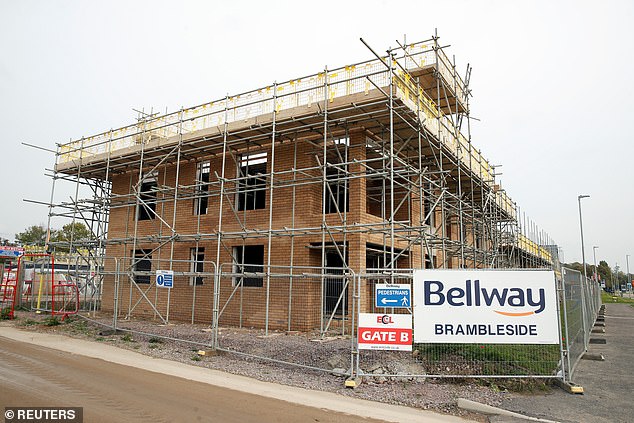Housebuilder Bellway restores dividend as the stamp duty holiday lifts summer house sales sharply
- Bellway’s reservations shot up 30.6% in the first nine weeks from August 1
- Chancellor Rishi Sunak suspended stamp duty on home buys under £500,000
- The FTSE 250 firm cancelled its dividend after its building sites closed in March
Homebuilder Bellway says the government’s stamp duty discount has enabled it to resume dividend payments after it recorded high sales during the late summer period.
The Newcastle-based firm scrapped its interim dividend in late March after it was forced to shut building sites and sales centres in response to the coronavirus pandemic.
House purchases took an inevitable tumble, but soared in the last few months as lockdown restrictions were relaxed. Reservations shot up 30.6 per cent in the nine weeks from August 1 compared to the same period in 2019.

Bellway said the stamp duty cut introduced in early July has enhanced ‘consumer confidence’
Bellway also revealed it had a record order book valued at £1.87billion a fortnight ago and is expecting to sell about 9,000 homes in the new financial year at an average price of around £290,000.
The FTSE 250 group said the stamp duty cut introduced in early July has boosted ‘consumer confidence,’ as has the Help-to-Buy shared equity scheme and a revival in the used property market.
Chancellor Rishi Sunak suspended payments of the tax on home buys under £500,000 to try and reinvigorate the sector. The following month, house prices rose at their fastest monthly pace in over 16 years.
Total reservations in the ‘typically quiet month’ of July were large, but still down 13.6 per cent on the previous year’s levels at 140 per week.
By contrast, from August 1 2019 to the start of the lockdown on March 23 this year, they averaged 211 per week, ten greater than during the same timeline in the previous fiscal year.
In the year to July 31, the coronavirus caused the FTSE 250 property developer’s revenues and housing completions to both decline by approximately 30 per cent, while pre-tax profits plummeted by 64.3 per cent to £236.7million.


Covid-19 caused Bellway’s housing completions to fall by 31 per cent in the year to July 31
The company said it took a Covid-19 related-expense of £25.8million, with almost £10million coming from cancelled land deals and over £14million arising from disruption to construction activity.
Further provisions covering fire safety and re-cladding measures following the release of new government guidance in January in response to the Grenfell Tower disaster added another £46.8million in costs.
Bellway’s chief executive James Honeyman warned that the residential construction industry faces several significant risks in the coming year.
He wrote: ‘Output for the full year will depend upon the continuation of sales demand, which could be affected by sector-wide risks such as rising unemployment and the forthcoming changes in both the stamp duty and Help-to-Buy rules.
‘The Board also recognises the risk posed by the uncertain outcome of future trade deals with both the European Union and the rest of the world.’
He though that Bellway’s ‘strong balance sheet not only instils confidence in times of uncertainty, but it also provides substantial capacity for disciplined land and work-in-progress investment.’


Julie Palmer: ‘The loss of more jobs and people becoming increasingly worried that they won’t always have a reliable income to support a new home will only add to the barriers for buying’
Trade body The Construction Product Association (CPA) released analysis yesterday predicting that new private housing constructions will fall by almost half and the number of completed private dwellings will drop by around a quarter in 2020.
This is a considerable improvement on its forecast in August; however, the organisation believes the housebuilding industry will not recover its pre-pandemic building levels until 2022.
‘Bellway will be wary that many people may start to hold off buying,’ remarked Julie Palmer, a partner at corporate restructuring firm Begbies Traynor.
‘The stamp duty break and the end of help-to-buy in April 2021, may not be enough to keep the market ploughing forward while the loss of more jobs and people becoming increasingly worried that they won’t always have a reliable income to support a new home will only add to the barriers for buying.’
Shares in Bellway were down 4.1 per cent to £25.18 at around half past midday.
